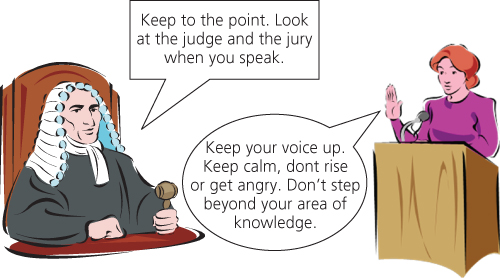Chapter 23 As a clinician you may be called to give evidence (see Box 23.1) in a variety of courts. Most commonly this will be in: Usually you will already have provided a witness statement (see Chapter 22). It is said that ‘if you write a good statement, you won’t be called to court’. This is unhelpful, as it implies that if you are called, your statement was of poor quality. It is also incorrect, as there are numerous reasons why you might be called. Court procedures are generally ‘adversarial’ or ‘inquisitorial’. What you say in court is unlikely to be affected by this distinction, since your overriding duty is to assist the court, not to support the ‘side’ by whom you are called. When you provide your statement, include dates on which you are unavailable to attend and keep these up to date. You must be aware that you might be called to court. If you do not attend when required, this can result in significant and serious consequences for you: a reprimand, a fine or even custody, if you are found guilty of contempt of court. Benjamin Franklin, 1706–1790 Read through your statement and contemporaneous notes several times. Make a copy to take with you. Consider highlighting areas that you will want to find easily, such as the patient’s name, dates and times and so on. Think how to explain findings and conditions, as well as what you might be asked and how you will answer (but don’t worry if your predictions aren’t fulfilled). Make the most of the witness care unit or liaison services. They are there for all witnesses: tell them if you have not been to court before or have any particular requirements (e.g. wheelchair access). Ask if you can visit the court ahead of time to see its layout; you may not be able to visit the court in which the trial or hearing is to take place, but taking a look around a different one will give you an idea of what to expect. Although trials are listed to last a few days, clinicians are rarely needed at 9.00 a.m. on the first day: check with the witness care unit or the police officer-in-the-case. An oft-used adage is, ‘Stand up, speak up and shut up’. Essentially this means: look professional, appear confident and capable (but not arrogant), make sure your audience can hear you and do not answer questions that are not within your knowledge or field (see Figure 23.1 and Box 23.2). Figure 23.1 Top tips from experienced colleagues.
Going to Court
OVERVIEW
Box 23.1 What should I do when I get a court warning or notification to attend?
Preparation
By failing to prepare, you are preparing to fail
On the day the trial starts
What to take with you
What else should you do?
Before you go into court
When you go in

Basicmedical Key
Fastest Basicmedical Insight Engine



